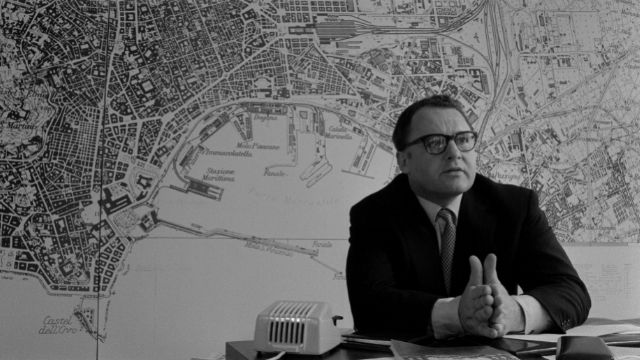LE MANI SULLA CITTÀ (1963, Francesco Rosi)


Democracia em obras.
Num minucioso registo neo-realista, LE MANI SULLA CITTÀ (AS MÃOS SOBRE A CIDADE, vencedor do Leão de Ouro, em 1963, no Festival de Veneza) imprime vivacidade aos contornos burocráticos do promíscuo e corrupto tráfico de influências entre política e o grande capital na Europa do pós-Segunda Guerra Mundial, levando-nos a reconhecer que este contexto sócio-político, temporalmente falando, não nos é inteiramente desconhecido. A sua subtil conclusão moral — com tanto de catártico como de revoltante — reveste-se de visualização quase obrigatória para eleitores e candidatos.
Num minucioso registo neo-realista, LE MANI SULLA CITTÀ (AS MÃOS SOBRE A CIDADE, vencedor do Leão de Ouro, em 1963, no Festival de Veneza) imprime vivacidade aos contornos burocráticos do promíscuo e corrupto tráfico de influências entre política e o grande capital na Europa do pós-Segunda Guerra Mundial, levando-nos a reconhecer que este contexto sócio-político, temporalmente falando, não nos é inteiramente desconhecido. A sua subtil conclusão moral — com tanto de catártico como de revoltante — reveste-se de visualização quase obrigatória para eleitores e candidatos.
Democracy in the works.
In its thorough neorealist portrait, LE MANI SULLA CITTÀ (a.k.a. HANDS OVER THE CITY, winner of the Venice Golden Lion in 1963) pulls a lot of liveliness to the bureaucratic aspects of the promiscuous and corrupt influence peddling between politics and financial interests in the post-World War II, making easy to acknowledge that this socio-political background is neither dated nor unfamiliar. The film's subtle moral conclusion (cathartic and outrageous in equal share) is of almost compulsory viewing for voters and candidates alike.
In its thorough neorealist portrait, LE MANI SULLA CITTÀ (a.k.a. HANDS OVER THE CITY, winner of the Venice Golden Lion in 1963) pulls a lot of liveliness to the bureaucratic aspects of the promiscuous and corrupt influence peddling between politics and financial interests in the post-World War II, making easy to acknowledge that this socio-political background is neither dated nor unfamiliar. The film's subtle moral conclusion (cathartic and outrageous in equal share) is of almost compulsory viewing for voters and candidates alike.

- . Ficha Técnica / Credits:
| Realização / Directed by | Francesco Rosi | ||
| Produção / Produced by | Lionello Santi | ||
| Argumento / Written by | Enzo Forcella, Raffaele La Capria, Enzo Provenzale, Francesco Rosi | ||
| Fotografia / Cinematography by | Gianni Di Venanzo | ||
| Música / Music by | Piero Piccioni | ||
| Elenco / Cast | Rod Steiger (Edoardo Nottola), Salvo Randone (Professor De Angelis), Guido Alberti (Maglione), Marcello Cannavale (Amigo de Nottola), Dante Di Pinto (Presidente da Comissão de Inquérito / President of Inquiry Committee), Carlo Fermariello (De Vita) | ||
| Ano / Year of release | 1963 | ||
| País / Country | França | Itália / France | Italy |
Excelente resumo crítico deste filme, tão certeiro.
ResponderEliminarCumprimentos cinéfilos :*